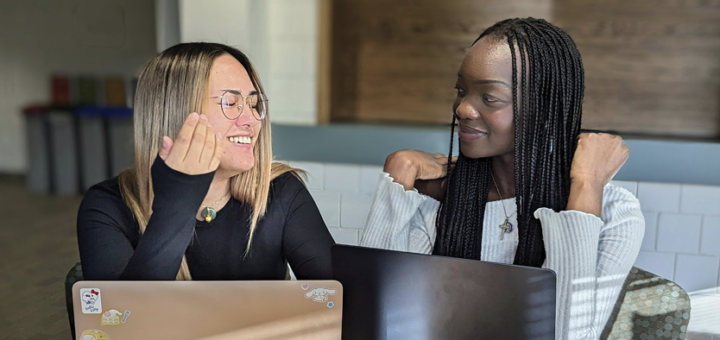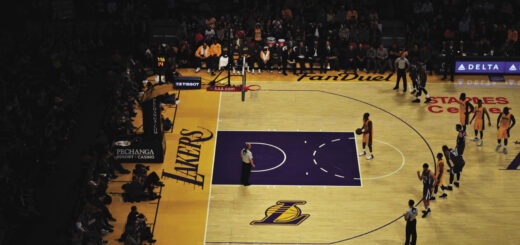Generation Alpha: “Can be good, and terribly bad for too many reasons.”

By Arroy (AJ) Jacob, Staff Writer
As the clock of human history continues ticking, the spotlight shifts onto a new set of cast on stage. Since the years 1997 and 2012 the spotlight was on Generation Z, individuals who are now on the cusp of adulthood. Now they must look to the centre-left stage and bear witness to their replacements: enter Generation Alpha, born between the years 2013 and 2024.
Born in 2002, I entered North America post-9/11, an era of constant fear. Because of this, previous generations loved setting expectations for us, hoping we would grow up to change our world. And soon enough, I was having the same thoughts for the generation replacing me. I wanted to delve deeper into this phenomenon with people my age. How will our world change once the younger generation pull up their pants? What is Generation Z expecting from Generation Alpha?
Social media
Meet Hana Baya and Mikaela Olpindo, two Gen Z Mount Royal University (MRU) sociology majors. They both specialize and have experience in studying human cultures and societal evolution.
We sat with our Booster Juice in hand and I asked what they think Gen Alpha’s relationship to social media will look like.
Baya puts in her two cents. “Do you remember those family vlogging channels? When you’d have a nuclear family of two parents constantly shoving a camera in their childrens’ faces. Those kids were generally Gen Alpha, right? They are the ones whose faces and bodies are forever left on the internet for everyone to see. They didn’t even know this was happening, they’re getting a taste of being a spectacle without their consent.”
And isn’t that terrible? Gen Z is the first generation to bear witness to a new phenomenon of children being the pride and soul for society’s online entertainment. We’ve seen it occur for decades before, but now that any adult can instantly hit ‘record’ on their smartphone, the world can now receive an influx of media ‘starring’ somebody’s kids, for anyone to see and use. However, what implications may this have on these kids as they grow to become young adults?
We turned to Olpindo, as she had something to say, “These kids are going to live with a new form of trauma. So when they grow older, privacy and security is going to be incredibly important to them. We’re seeing that happen right now in Gen Z and millennials, when you look at cybersecurity and the VPN industry.”
She continues, “The way TikToks are generally made in our generation, is that they place the camera in front of their face, for the world to see. Maybe in the future, this won’t be how Gen Alpha handles online entertainment. Maybe they will revolutionize a new social media platform where everyone can stay anonymous, and do and say whatever they want without the repercussions of their actions. Maybe privacy is going to be a form of currency. And this can be good, and terribly bad for too many reasons.”
Socialization
I sipped my Booster Juice as I took in their opinions and speculations; so far incredibly enlightening. Then I asked what their opinions are regarding possible societal expectations of Gen Alpha.
Baya starts, “Well if Gen Alpha grew up with their devices, they aren’t gonna know a life without it. Taking it away might not be possible anymore. Meaning, that we could see Gen Alpha’s networking ability and socialization completely digital. For example, my sister is Gen Alpha, and she’s very knowledgeable about the world. But she doesn’t usually leave the house except to go to school, but she’s still very conscious of everything that happens.”
Olpindo seconds Baya’s experience, “My youngest brother is also Gen Alpha, and he’s really sweet. I’ve noticed that he has much more of a balance with his relationships. And I wonder how he’s been influenced as such, maybe he was just on that side of TikTok that is slowly changing the way that he sees other people around him.”
She continues, “We are socialized by our parents and guardians, but our primary socialization comes from teachers or classmates. Our socialization takes place in the classroom. And so if you put the two concepts we talked about together, does that mean that we’re moving into school online? I don’t know!”
Baya: “I mean, we’ve seen this happen with COVID.”
Olpindo: “And it was good for some kids, and worse for others.”
Baya: “You mean, good for some Gen Alphas, and worse from some Gen Zs.”
After the interview had settled, they showed me photos of their younger siblings. We scrolled through, and I looked back at the elder sisters looking at the photos. In their eyes, you can see a strain of concern, twinkle and excitement as they have the privilege to watch their little understudies replace them at the centre stage of society.




